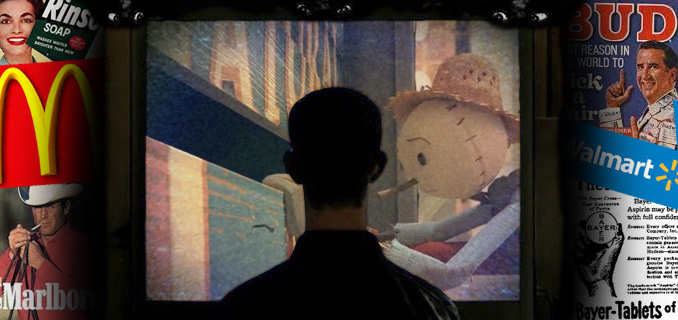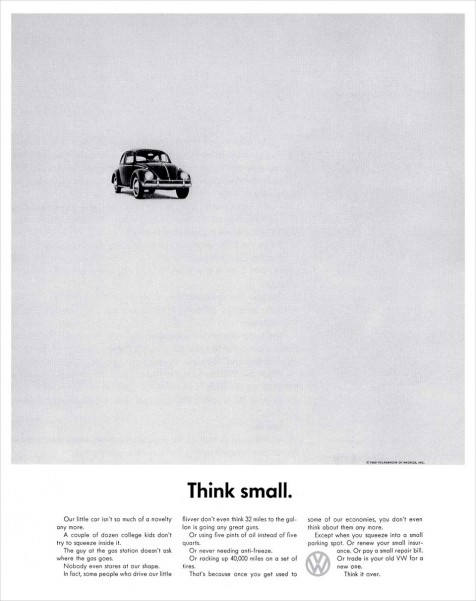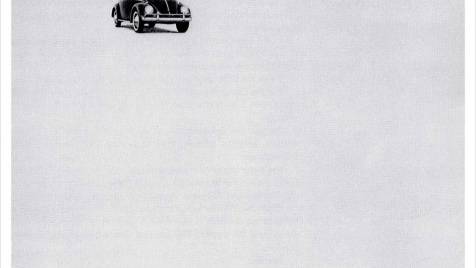Ad nauseam: Anti Consumerism A Secret Weapon
Source: aeonmagazine.com

The more we hate it, the more it agrees with us. How advertising turned anti-consumerism into a secret weapon
In 1796, the English physician Edward Jenner injected an eight-year-old boy in Gloucestershire with cowpox. Reasoning that absorbing a small amount of the virus would protect the child from a full-strength attack of smallpox in the future, Jenner’s bold experiment founded the practice of vaccination. Two hundred years later, the marketing industry has cottoned on to Jenner’s insight: a little bit of a disease can be a very useful thing.
If you’re one of the more than 7 million people who have watched the global fast-food chain Chipotle’s latest advertisement, you’ll have experienced this sleight of hand for yourself. The animated short film — accompanied by a smartphone game — depicts a haunting parody of corporate agribusiness: cartoon chickens inflated by robotic antibiotic arms, scarecrow workers displaced by ruthless automata. Chipotle’s logo appears only at the very end of the three-minute trailer; it is otherwise branding-free. The motivation for this big-budget exposé? ‘We’re trying to educate people about where their food comes from,’ Mark Crumpacker, chief marketing officer at Chipotle, told USA Today, but ‘millennials are sceptical of brands that perpetuate themselves’.
Never mind that Chipotle itself — with more than 1,500 outlets across the US, and an annual turnover of $278 million — is hardly treading lightly on the world’s agricultural system. The real story is that the company is using a dose of anti-Big Food sentiment to inoculate the viewer against not buying any more of its burritos. Chipotle are very happy to sell the idea that they’re on our side if it helps to keep the millennials happy. If it’s advertising we don’t like, then it’s advertising we won’t get.
In the UK, the telecommunications giant Orange creates cinema ads which are spoof scenes from well-known feature films, doctoring the scripts to include gratuitous references to cell phones. One popular instalment features the actor Jack Black recreating a scene from Gulliver’s Travels (2010), in which Gulliver is captured by the tiny Lilliputians and lashed to the ground with ropes. As the product placements for Orange become increasingly blatant, Black realises he has been tricked into acting in a cellphone ad, breaks character and begins a speech about how he won’t be duped by Orange. ‘Don’t let a mobile phone ruin your film’ runs the slogan. It’s annoying, but they know this. And they know that you know that they know. And ... well you get the gist.
These ads want to be our friends — to empathise with us against the tyranny of the corporate world they inhabit. Just when we thought we’d cottoned on to subliminal advertising, personalised sidebars on web pages, advertorials and infomercials, products started echoing our contempt for them. ‘Shut up!’ we shout at the TV, and the TV gets behind the sofa and shouts along with us.
It seems almost quaint, now that popular culture is riddled with knowing, self-referential nods to itself, but the aim of advertising used to be straightforward: to associate a product in a literal and direct way with positive images of a desirable, aspirational life. How we chortle at those rosy-cheeked families that dominated commercials in the post-war era. Nowadays, we adopt the slogans and imagery as ironic home decor — wartime advertisements for coffee adorn our kitchen walls; retro Brylcreem posters are pinned above the bathroom door. But our reappropriation of artefacts from a previous era of consumerism sends a powerful message: we wouldn’t be swayed by such naked pitches today.

Genre-subverting ads started to emerge as early as 1959, when the Volkswagen Beetle’s US ‘Think Small’ campaign began poking fun at the German car’s size and idiosyncratic design. In stark contrast to traditional US car adverts, whose brightly coloured depictions of gargantuan front ends left the viewer in no doubt that bigger was better, the Beetle posters left most of the page blank, a tiny image of the car itself tucked away in a corner. These designs spoke to a generation that was becoming aware of how the media and advertising industries worked. The American journalist Vance Packard had blown the whistle on the tricks of the advertising trade in The Hidden Persuaders (1957), and younger consumers increasingly saw themselves as savvy. Selling to this demographic required not overeager direct pitches, but insouciant ‘cool’, laced with irony.
In subsequent decades, self-aware adverts became the norm, and advertising began to satirise the very concept of itself. In 1996, Sprite launched a successful campaign with the slogan ‘Image is nothing. Thirst is everything. Obey your thirst’. In 2010, Kotex sent up the bizarre conventions of 1980s tampon adverts (happy, dancing women, jars of blue liquid being spilt) by flashing up the question ‘Why are Tampon adverts so ridiculous?’ before displaying its latest range of sanitary products.
‘Companies try to convince you that they are part of your family,’ says Tim Kasser, professor of psychology and an expert on consumer culture at Knox College in Illinois. ‘They want to create a sense of connection or even intimacy between the viewer and the advertiser. An ad that says: “Yes, I know you know that I’m an ad, and I know that you know that I’m annoying you” is a statement of empathy, and thus a statement of connection. And as any salesperson will tell you, connection is key to the sales.’
This technique of cultivating empathy through shared cynicism has taken off over the past decade. Today, ads for sports drinks bemoan the abundance of minutely differentiated sports drinks on the market, and beers yearn for the day when a beer was just a beer. The Swedish brewery Kopparberg has done more than any other company to promote the idea that cider can come in many delicious fruity flavours, so if anyone is to blame for the difficulty in buying plain old apple cider, it is Kopparberg. Yet their most recent invention is ‘Naked’ apple cider. As the company’s UK managing director Davin Nugent told The Morning Advertiser:
Innovation through fruit is not enough. The bigger picture is apple cider and we’re opening the back gate into the category. The apple taste in cider has been lost and become bland… we’re on to something exciting.
Corporate advertising is the ultimate shape-shifter; the perpetual tease. No sooner had the virulently anti-capitalist ‘Occupy Wall Street’ movement begun than the American rapper Jay Z’s clothing label created and marketed an ‘Occupy All Streets’ spin-off T-shirt. But as citizen cynicism has advanced, the space in which advertising can operate without tripping on its own rhetoric has become ever more restricted, and ever more bizarre.
[...]
Read the full article at: aeonmagazine.com
Tune into Red Ice Radio:
Eldon Taylor - Subliminal Programming, Media Persuasion, Mind Control & Breaking the Spell
Dominick Ohrbeck - Reptilian Marketing vs. The HeartBrain Model
Neil Sanders - Hour 1 - The Dark Art of Mind Control
Nick Begich - Hour 1 - Controlling the Human Mind
Ben Singleton - Pseudoccult Media
Stewart Swerdlow - Colors, Archetypes, Symbols & Mind Control
Red Ice TV:
Episode 4 - Symbolism in Logos
Episode 3 - Illuminati Symbolism in Hollywood Movies






















